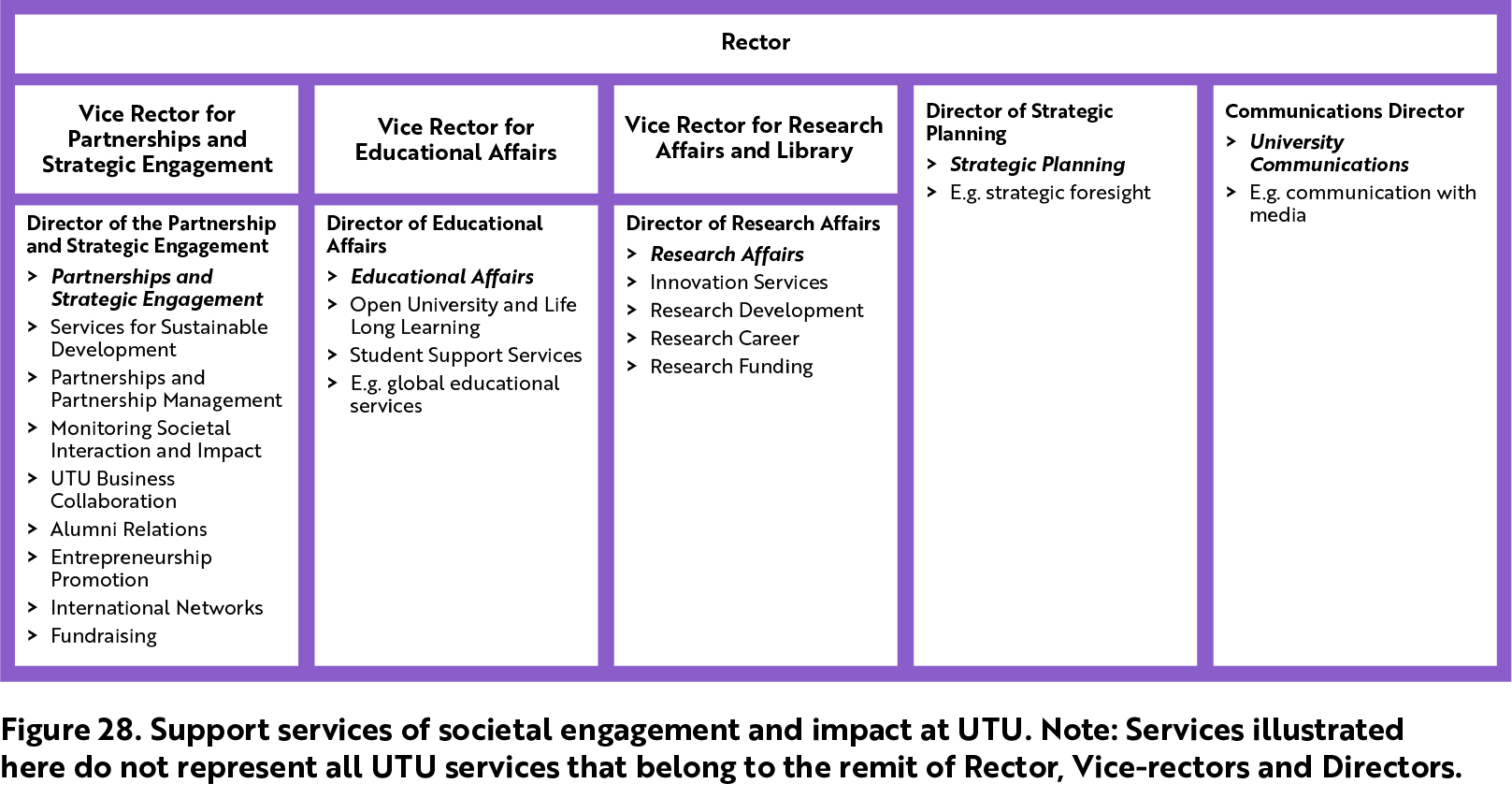Support Services for Societal Impact and Engagement
The support services for societal impact and engagement at UTU have been recently strengthened. They were placed under the responsibility of the Vice Rector for partnerships and strategic engagement with a unit with the same name, and complemented by services provided by several other units in the support services. Services presented here are primarily focused on supporting UTU community.
Through societal interaction, UTU actively enhances the creation of positive development in society. Strategic Goal of UTU is to be a proactive and dynamic partner (Figure 27). Accordingly, UTU aims to be a respected and responsible societal contributor. Furthermore, UTU builds and maintains strong regional partnerships that make UTU’s operational environment unique and internationally attractive.

UTU has five units (Figure 28) with services focused on supporting and highlighting the positive trajectories created through UTU’s basic tasks. These include responsibilities in the University-level partnerships and strategic engagement on a national as well as international level, continuous learning, research and innovation support, strategic development, and increasing the visibility of UTU’s societal impact and engagement. The units support the UTU community also by issuing University-level guidelines and policies, intermediating between administration and faculties, aiding the UTU management in decision-making, and providing personalised guidance to the members of the University community. Services are accessible to entire UTU community.

Fund-raising activities communicate about UTU to society in a diverse manner, thereby expanding the awareness of the University’s impact. The fund-raising services is responsible for University-level donations as well as supporting the faculties in their fund-raising. UTU exceeded its €5M fund-raising goal for the state-matched funding scheme 2020–2022. Fund raising policy is expected to be issued by April 2023. Partnerships and partnership management services support UTU’s decision-making and operational development. It is supported by a partnership management system which is currently under development. UTU was successful in forming two new University-level strategic partnerships in 2022. Policy for strategic and University-level partnerships was approved in 2022.
UTU Business Collaboration (UBC) boosts research project funding preparation with companies. The impact can include increased sustainability and better competitiveness. Since the service was established in 2021, UTU has been successful in increasing the number of applications submitted to Business Finland (Co-Creation and Co-Innovation). The UBC services are implemented together with the Innovation Services and it complements the Research Funding in the Research Affairs. In the same unit, Research Development analyses the services for impact at different stages of the research process. It also organises training for different profiling areas in UTU. UTU is particularly focused on the promotion of open science and was placed on the highest level in Finland in 2022.
Entrepreneurship promotion services increase entrepreneurial thinking and activity, and support the development of research-driven innovations at UTU. Through the services, students and researchers are introduced to and supported in entrepreneurial matters which ultimately boost business activity and economy. In 2022, UTU was awarded as the first Finnish university with the international ACEEU (Accreditation Council for Entrepreneurial and Engaged Universities) accreditation for its efforts in entrepreneurship promotion and societal engagement. The Innovation Services work in collaboration with the entrepreneurship promotion services in guiding individuals in the early stages of business development. The unit is also responsible for the statutory innovation notification process and coordinates a systematic method for searching, screening, and upgrading innovation proposals. In addition, it coordinates the “Research to business” funding. Since 2012, UTU has received funding for 44 out of 62 projects (71%) and for 45 out of 89 applications (51%) with the total funding being 16.26M€.
The 50,000 alumni form an important interest group for UTU. The alumni relations are steered with annual action plans. The focus is on the faculties and units that collaborate with their alumni in the way that best suits their discipline. The objective of the centralised alumni relations is to support the faculties in strengthening their alumni co-operation through offering advice, increasing communications, and organising events. Recently, services especially for the international alumni have been strengthened.
Internal collaboration between different services and shared teams across units create synergy. For example, services for sustainable development and international networks both support the creation of domestic and global societal impact by implementing the UN’s sustainable development goals. In 2022, UTU launched an ambitious Action Plan for Sustainable Campus Life and, already in 2018, committed to carbon neutrality by 2025. Another example is the monitoring and assessment of societal interaction and impact, which includes collecting, analysing, and distributing information to management and faculties. This work is realised in co-operation with the Strategic Planning unit. The Rector provides feedback to faculties once per year on their societal interaction.
Faculties, units, and support services (e.g. Partnerships and Strategic Engagement) are responsible for disseminating the research results to society, e.g. by influencing decision-making. They are supported by the University Communications that communicate and monitor UTU’s public image which is formed through research and education. Educational Affairs offers support and advice in matters and processes related to undergraduate education, but also in continuous learning, where impact is achieved primarily through the open university education. These services also include Global Educational Services that made 25 education export deals in 2021.
